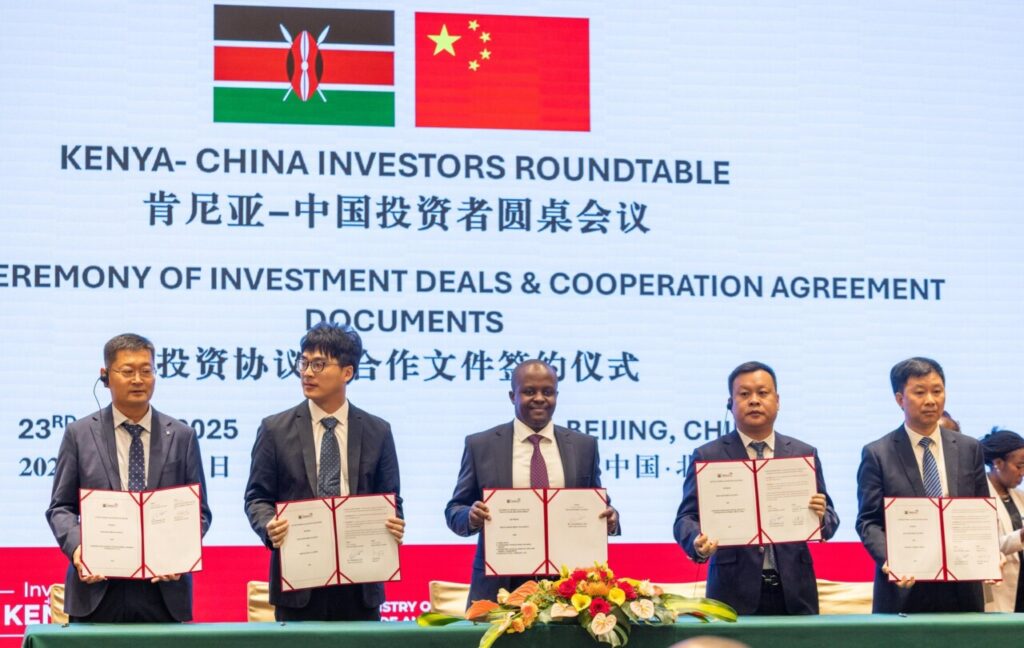Kenyan President William Ruto has sealed a landmark $1 billion agreement with China, underscoring Nairobi’s deepening ties with Beijing during a four-day state visit aimed at advancing mutual economic interests.
The deal, signed in Beijing, channels funding into President Ruto’s Bottom-Up Economic Transformation Agenda (BETA), with major manufacturing, agriculture, and tourism allocations.
Speaking at a ceremony in the Chinese capital, President Ruto reaffirmed the long-standing development cooperation between the two countries, which he said has significantly altered Kenya’s infrastructure landscape. “We have achieved many things together,” he said.
“Kenya is a member of the Belt and Road Initiative, and the results are visible — from the Mombasa–Nairobi–Naivasha railway to the Mombasa oil terminal and numerous road projects. These are not only reshaping Kenya but enhancing regional connectivity across East Africa.”
President William Ruto
Of the newly signed agreements, $320 million will go into manufacturing, $430 million into agriculture, and $230 million will support tourism initiatives. Among these are notable investments such as a $150 million deal with China Wu Yi for construction, a $400 million agricultural partnership with Zonken Group in Baringo County, and a tourism development plan by Hunan Conference Exhibition Group, marking the company’s entry into Kenya with a $230 million commitment.

This visit, President Ruto’s third to China since assuming office, comes as global powers reassess alliances in response to shifting economic dynamics. The Kenyan leader framed the visit as an affirmation of a shared commitment to economic prosperity. “This visit speaks to the enduring friendship between our two countries and our shared vision for a prosperous future,” Ruto told delegates and Chinese officials.
Trade between the two nations continues to flourish. In the first quarter of 2025, bilateral trade soared to 16.13 billion yuan (approximately $2.2 billion), an 11.9% increase compared to the same period last year. This growth marks the sixth straight quarter of expansion, driven largely by rising Chinese exports of electronics, household appliances, and advanced manufacturing equipment to Kenya.
Partnership Targets Growth In Key Sectors
Kenyan agricultural exports to China are also witnessing a remarkable surge. Since gaining access to the Chinese market in 2022, Kenya has exported over 6,800 tons of avocados worth 90 million yuan, making it China’s third-largest supplier of fresh avocados. Tea exports climbed 175.2% in the first quarter of 2025, while crab shipments increased by 30.7%, highlighting a growing Chinese appetite for Kenyan produce.
China’s influence in Kenya’s large-scale projects remains considerable. Construction is underway for the Nairobi Kingdom Tower, poised to become one of East Africa’s tallest skyscrapers. Meanwhile, Chinese firms are leading the charge in implementing 5G infrastructure, a move expected to propel Kenya’s digital transformation and economic connectivity.
Kenya also continues to draw heavily on Chinese loans to support infrastructure expansion. The bulk of KSh 68.7 billion in new loans this year comes from the China Development Bank, with a focus on road upgrades and critical public works. Aware of rising debt levels, President Ruto’s administration has committed to prudent borrowing practices and responsible debt management to ensure long-term fiscal sustainability.
The visit concluded with the signing of 20 new cooperation agreements spanning science, technology, vocational training, intelligent transport, and water resource management. These accords point to a broadening partnership that extends beyond traditional infrastructure to include cutting-edge sectors.
With China’s Belt and Road Initiative as a backdrop, Kenya is positioning itself as a central hub for Beijing’s strategic interests on the continent. Through expanded trade, targeted investments, and sustained diplomatic engagement, the East African nation is cementing its place as a key economic partner in the evolving Sino-African landscape.
READ ALSO: NPP Sponsors National Tour, Shifting Away From Tradition























